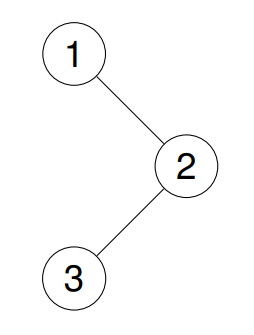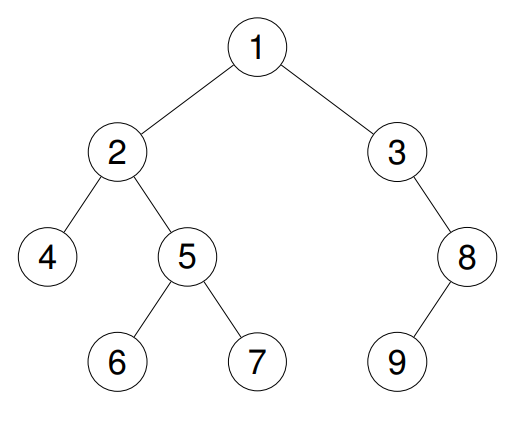| comments | difficulty | edit_url | tags | ||||
|---|---|---|---|---|---|---|---|
true |
Easy |
|
Given the root of a binary tree, return the preorder traversal of its nodes' values.
Example 1:
Example 2:
Example 3:
Input: root = []
Output: []
Example 4:
Input: root = [1]
Output: [1]
Constraints:
- The number of nodes in the tree is in the range
[0, 100]. -100 <= Node.val <= 100
Follow up: Recursive solution is trivial, could you do it iteratively?
We first visit the root node, then recursively traverse the left and right subtrees.
The time complexity is
# Definition for a binary tree node.
# class TreeNode:
# def __init__(self, val=0, left=None, right=None):
# self.val = val
# self.left = left
# self.right = right
class Solution:
def preorderTraversal(self, root: Optional[TreeNode]) -> List[int]:
def dfs(root):
if root is None:
return
ans.append(root.val)
dfs(root.left)
dfs(root.right)
ans = []
dfs(root)
return ans/**
* Definition for a binary tree node.
* public class TreeNode {
* int val;
* TreeNode left;
* TreeNode right;
* TreeNode() {}
* TreeNode(int val) { this.val = val; }
* TreeNode(int val, TreeNode left, TreeNode right) {
* this.val = val;
* this.left = left;
* this.right = right;
* }
* }
*/
class Solution {
private List<Integer> ans = new ArrayList<>();
public List<Integer> preorderTraversal(TreeNode root) {
dfs(root);
return ans;
}
private void dfs(TreeNode root) {
if (root == null) {
return;
}
ans.add(root.val);
dfs(root.left);
dfs(root.right);
}
}/**
* Definition for a binary tree node.
* struct TreeNode {
* int val;
* TreeNode *left;
* TreeNode *right;
* TreeNode() : val(0), left(nullptr), right(nullptr) {}
* TreeNode(int x) : val(x), left(nullptr), right(nullptr) {}
* TreeNode(int x, TreeNode *left, TreeNode *right) : val(x), left(left), right(right) {}
* };
*/
class Solution {
public:
vector<int> preorderTraversal(TreeNode* root) {
vector<int> ans;
function<void(TreeNode*)> dfs = [&](TreeNode* root) {
if (!root) {
return;
}
ans.push_back(root->val);
dfs(root->left);
dfs(root->right);
};
dfs(root);
return ans;
}
};/**
* Definition for a binary tree node.
* type TreeNode struct {
* Val int
* Left *TreeNode
* Right *TreeNode
* }
*/
func preorderTraversal(root *TreeNode) (ans []int) {
var dfs func(*TreeNode)
dfs = func(root *TreeNode) {
if root == nil {
return
}
ans = append(ans, root.Val)
dfs(root.Left)
dfs(root.Right)
}
dfs(root)
return
}/**
* Definition for a binary tree node.
* class TreeNode {
* val: number
* left: TreeNode | null
* right: TreeNode | null
* constructor(val?: number, left?: TreeNode | null, right?: TreeNode | null) {
* this.val = (val===undefined ? 0 : val)
* this.left = (left===undefined ? null : left)
* this.right = (right===undefined ? null : right)
* }
* }
*/
function preorderTraversal(root: TreeNode | null): number[] {
const ans: number[] = [];
const dfs = (root: TreeNode | null) => {
if (!root) {
return;
}
ans.push(root.val);
dfs(root.left);
dfs(root.right);
};
dfs(root);
return ans;
}// Definition for a binary tree node.
// #[derive(Debug, PartialEq, Eq)]
// pub struct TreeNode {
// pub val: i32,
// pub left: Option<Rc<RefCell<TreeNode>>>,
// pub right: Option<Rc<RefCell<TreeNode>>>,
// }
//
// impl TreeNode {
// #[inline]
// pub fn new(val: i32) -> Self {
// TreeNode {
// val,
// left: None,
// right: None
// }
// }
// }
use std::cell::RefCell;
use std::rc::Rc;
impl Solution {
fn dfs(root: &Option<Rc<RefCell<TreeNode>>>, ans: &mut Vec<i32>) {
if root.is_none() {
return;
}
let node = root.as_ref().unwrap().borrow();
ans.push(node.val);
Self::dfs(&node.left, ans);
Self::dfs(&node.right, ans);
}
pub fn preorder_traversal(root: Option<Rc<RefCell<TreeNode>>>) -> Vec<i32> {
let mut ans = vec![];
Self::dfs(&root, &mut ans);
ans
}
}The idea of using a stack to implement non-recursive traversal is as follows:
- Define a stack
$stk$ , and first push the root node into the stack. - If the stack is not empty, pop a node from the stack each time.
- Process the node.
- First push the right child of the node into the stack, then push the left child of the node into the stack (if there are child nodes).
- Repeat steps 2-4.
- Return the result.
The time complexity is
# Definition for a binary tree node.
# class TreeNode:
# def __init__(self, val=0, left=None, right=None):
# self.val = val
# self.left = left
# self.right = right
class Solution:
def preorderTraversal(self, root: Optional[TreeNode]) -> List[int]:
ans = []
if root is None:
return ans
stk = [root]
while stk:
node = stk.pop()
ans.append(node.val)
if node.right:
stk.append(node.right)
if node.left:
stk.append(node.left)
return ans/**
* Definition for a binary tree node.
* public class TreeNode {
* int val;
* TreeNode left;
* TreeNode right;
* TreeNode() {}
* TreeNode(int val) { this.val = val; }
* TreeNode(int val, TreeNode left, TreeNode right) {
* this.val = val;
* this.left = left;
* this.right = right;
* }
* }
*/
class Solution {
public List<Integer> preorderTraversal(TreeNode root) {
List<Integer> ans = new ArrayList<>();
if (root == null) {
return ans;
}
Deque<TreeNode> stk = new ArrayDeque<>();
stk.push(root);
while (!stk.isEmpty()) {
TreeNode node = stk.pop();
ans.add(node.val);
if (node.right != null) {
stk.push(node.right);
}
if (node.left != null) {
stk.push(node.left);
}
}
return ans;
}
}/**
* Definition for a binary tree node.
* struct TreeNode {
* int val;
* TreeNode *left;
* TreeNode *right;
* TreeNode() : val(0), left(nullptr), right(nullptr) {}
* TreeNode(int x) : val(x), left(nullptr), right(nullptr) {}
* TreeNode(int x, TreeNode *left, TreeNode *right) : val(x), left(left), right(right) {}
* };
*/
class Solution {
public:
vector<int> preorderTraversal(TreeNode* root) {
vector<int> ans;
if (!root) {
return ans;
}
stack<TreeNode*> stk;
stk.push(root);
while (stk.size()) {
auto node = stk.top();
stk.pop();
ans.push_back(node->val);
if (node->right) {
stk.push(node->right);
}
if (node->left) {
stk.push(node->left);
}
}
return ans;
}
};/**
* Definition for a binary tree node.
* type TreeNode struct {
* Val int
* Left *TreeNode
* Right *TreeNode
* }
*/
func preorderTraversal(root *TreeNode) (ans []int) {
if root == nil {
return
}
stk := []*TreeNode{root}
for len(stk) > 0 {
node := stk[len(stk)-1]
stk = stk[:len(stk)-1]
ans = append(ans, node.Val)
if node.Right != nil {
stk = append(stk, node.Right)
}
if node.Left != nil {
stk = append(stk, node.Left)
}
}
return
}/**
* Definition for a binary tree node.
* class TreeNode {
* val: number
* left: TreeNode | null
* right: TreeNode | null
* constructor(val?: number, left?: TreeNode | null, right?: TreeNode | null) {
* this.val = (val===undefined ? 0 : val)
* this.left = (left===undefined ? null : left)
* this.right = (right===undefined ? null : right)
* }
* }
*/
function preorderTraversal(root: TreeNode | null): number[] {
const ans: number[] = [];
if (!root) {
return ans;
}
const stk: TreeNode[] = [root];
while (stk.length) {
const { left, right, val } = stk.pop();
ans.push(val);
right && stk.push(right);
left && stk.push(left);
}
return ans;
}Morris traversal does not require a stack, and its space complexity is
Traverse the binary tree nodes,
- If the left subtree of the current node
rootis empty, add the current node value to the result list$ans$ , and update the current node toroot.right. - If the left subtree of the current node
rootis not empty, find the rightmost nodepreof the left subtree (which is the predecessor of therootnode in inorder traversal):- If the right subtree of the predecessor node
preis empty, add the current node value to the result list$ans$ , then point the right subtree of the predecessor node to the current noderoot, and update the current node toroot.left. - If the right subtree of the predecessor node
preis not empty, point the right subtree of the predecessor node to null (i.e., disconnectpreandroot), and update the current node toroot.right.
- If the right subtree of the predecessor node
- Repeat the above steps until the binary tree node is null, and the traversal ends.
The time complexity is
# Definition for a binary tree node.
# class TreeNode:
# def __init__(self, val=0, left=None, right=None):
# self.val = val
# self.left = left
# self.right = right
class Solution:
def preorderTraversal(self, root: Optional[TreeNode]) -> List[int]:
ans = []
while root:
if root.left is None:
ans.append(root.val)
root = root.right
else:
prev = root.left
while prev.right and prev.right != root:
prev = prev.right
if prev.right is None:
ans.append(root.val)
prev.right = root
root = root.left
else:
prev.right = None
root = root.right
return ans/**
* Definition for a binary tree node.
* public class TreeNode {
* int val;
* TreeNode left;
* TreeNode right;
* TreeNode() {}
* TreeNode(int val) { this.val = val; }
* TreeNode(int val, TreeNode left, TreeNode right) {
* this.val = val;
* this.left = left;
* this.right = right;
* }
* }
*/
class Solution {
public List<Integer> preorderTraversal(TreeNode root) {
List<Integer> ans = new ArrayList<>();
while (root != null) {
if (root.left == null) {
ans.add(root.val);
root = root.right;
} else {
TreeNode prev = root.left;
while (prev.right != null && prev.right != root) {
prev = prev.right;
}
if (prev.right == null) {
ans.add(root.val);
prev.right = root;
root = root.left;
} else {
prev.right = null;
root = root.right;
}
}
}
return ans;
}
}/**
* Definition for a binary tree node.
* struct TreeNode {
* int val;
* TreeNode *left;
* TreeNode *right;
* TreeNode() : val(0), left(nullptr), right(nullptr) {}
* TreeNode(int x) : val(x), left(nullptr), right(nullptr) {}
* TreeNode(int x, TreeNode *left, TreeNode *right) : val(x), left(left), right(right) {}
* };
*/
class Solution {
public:
vector<int> preorderTraversal(TreeNode* root) {
vector<int> ans;
while (root) {
if (!root->left) {
ans.push_back(root->val);
root = root->right;
} else {
TreeNode* prev = root->left;
while (prev->right && prev->right != root) {
prev = prev->right;
}
if (!prev->right) {
ans.push_back(root->val);
prev->right = root;
root = root->left;
} else {
prev->right = nullptr;
root = root->right;
}
}
}
return ans;
}
};/**
* Definition for a binary tree node.
* type TreeNode struct {
* Val int
* Left *TreeNode
* Right *TreeNode
* }
*/
func preorderTraversal(root *TreeNode) (ans []int) {
for root != nil {
if root.Left == nil {
ans = append(ans, root.Val)
root = root.Right
} else {
prev := root.Left
for prev.Right != nil && prev.Right != root {
prev = prev.Right
}
if prev.Right == nil {
ans = append(ans, root.Val)
prev.Right = root
root = root.Left
} else {
prev.Right = nil
root = root.Right
}
}
}
return
}/**
* Definition for a binary tree node.
* class TreeNode {
* val: number
* left: TreeNode | null
* right: TreeNode | null
* constructor(val?: number, left?: TreeNode | null, right?: TreeNode | null) {
* this.val = (val===undefined ? 0 : val)
* this.left = (left===undefined ? null : left)
* this.right = (right===undefined ? null : right)
* }
* }
*/
function preorderTraversal(root: TreeNode | null): number[] {
const ans: number[] = [];
while (root) {
const { left, right, val } = root;
if (!left) {
ans.push(val);
root = right;
} else {
let prev = left;
while (prev.right && prev.right != root) {
prev = prev.right;
}
if (!prev.right) {
ans.push(val);
prev.right = root;
root = root.left;
} else {
prev.right = null;
root = root.right;
}
}
}
return ans;
}
